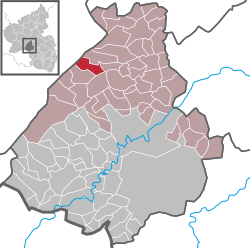Schauren
| Schauren | ||
|---|---|---|
|
||
| Coordinates: 49°48′33″N 7°14′17″E / 49.80917°N 7.23806°ECoordinates: 49°48′33″N 7°14′17″E / 49.80917°N 7.23806°E | ||
| Country | Germany | |
| State | Rhineland-Palatinate | |
| District | Birkenfeld | |
| Municipal assoc. | Rhaunen | |
| Government | ||
| • Mayor | Susanne Müller | |
| Area | ||
| • Total | 7.12 km2 (2.75 sq mi) | |
| Elevation | 520 m (1,710 ft) | |
| Population (2015-12-31) | ||
| • Total | 510 | |
| • Density | 72/km2 (190/sq mi) | |
| Time zone | CET/CEST (UTC+1/+2) | |
| Postal codes | 55758 | |
| Dialling codes | 06786 | |
| Vehicle registration | BIR | |
| Website | www.schauren.de | |
Schauren is an Ortsgemeinde – a municipality belonging to a Verbandsgemeinde, a kind of collective municipality – in the Birkenfeld district in Rhineland-Palatinate, Germany. It belongs to the Verbandsgemeinde of Rhaunen, whose seat is in the like-named municipality.
The municipality lies in the Hunsrück at the edge of the Idar Forest. The municipal area is 64.4% wooded.
Schauren borders in the north on the municipality of Hellertshausen, in the northeast on the municipality of Asbach, in the southeast on the municipality of Kempfeld, in the southwest on the municipality of Bruchweiler and in the northwest on the municipality of Morbach which, unlike all the others, is not in the Birkenfeld district, but rather in the Bernkastel-Wittlich district.
Also belonging to Schauren are the outlying homesteads of Aschiedermühle and Schaurenermühle.
In 1275, Schauren had its first documentary mention. In 1279, it was called Schuren; the name stems from the Old High German Scura. Even so, Schauren existed long before its first documentary mention. As with most villages on the slopes of the Idar Forest, several prehistoric graves unearthed within Schauren’s limits bear witness to very early settlers here, even as far back as the early Celtic Iron Age.
In 1351, the village was held by the Waldgraves of Kyrburg. By 1515, Schauren was still obliged to pay tithes or other levies to the Waldgraves and Rhinegraves. In 1816, in the wake of Napoleon’s downfall and the Congress of Vienna, French rule ended and Schauren found itself in the Kingdom of Prussia.
...
Wikipedia



